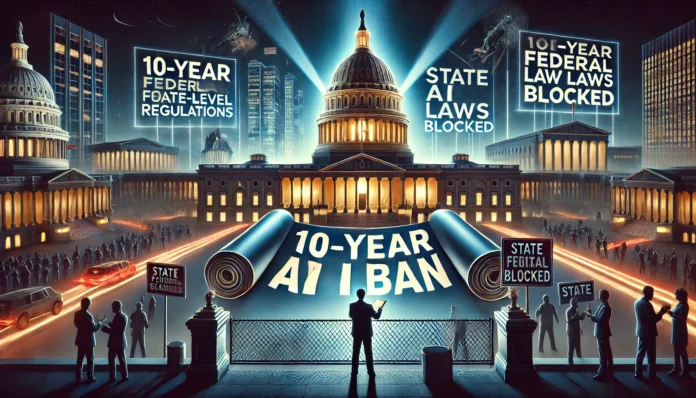In a narrow 215–214 vote, the U.S. House of Representatives has passed the «One Big Beautiful Bill Act» (OBBBA), a sweeping legislative package that includes a contentious provision: a 10-year moratorium on state and local governments enacting or enforcing laws regulating artificial intelligence (AI). The bill now moves to the Senate, where its future remains uncertain.
Federal vs. State Authority
Proponents argue that a unified federal approach is essential to prevent a fragmented regulatory landscape that could hinder innovation and competitiveness. Representative Gus Bilirakis emphasized the need for national consistency, stating that disparate state laws could «stifle advancement and benefit adversaries like China» .
However, critics contend that the moratorium undermines states’ rights to protect their residents from AI-related harms, such as deepfakes, discrimination in automated hiring, and privacy violations. A bipartisan group of 35 California lawmakers, including Governor Gavin Newsom, expressed strong opposition, highlighting that California has enacted 42 AI-related laws since 2015 .
Industry and Public Response
The tech industry is divided. While some companies favor a consistent federal framework, others worry that the moratorium could lead to regulatory gaps. Civil society groups and legal experts warn that the absence of state-level oversight could leave consumers vulnerable.
Senator Marsha Blackburn voiced concerns, referencing Tennessee’s «Elvis Act,» which protects against AI impersonations. She argued that without federal protections, states should retain the authority to address AI-related threats .
Legal and Legislative Hurdles
The bill’s inclusion of the AI regulation moratorium in a budget reconciliation package raises procedural questions. The Senate’s Byrd Rule prohibits provisions extraneous to the federal budget in reconciliation bills. If the moratorium is deemed non-germane, it could be stripped from the legislation .
Implications
If enacted, the moratorium would represent a significant shift in U.S. tech policy, centralizing AI regulation at the federal level and potentially influencing international approaches. The debate underscores the tension between fostering innovation and ensuring ethical oversight in the rapidly evolving AI landscape.




